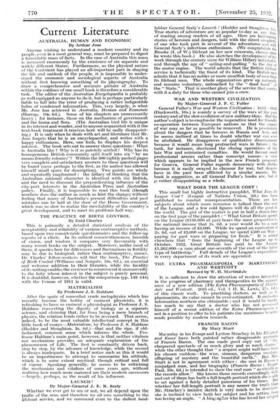Current Literature
AUSTRALIA, HUMAN AND ECONOMIC By Arthur Jose
• Anyone wishing to understand a modem country and its people, even in a most general way, must be prepared to digest a formidable mass of facts. In the case of Australia this mass is increased enormously by the existence of six separate and widely different States. Furthermore, as the physical nature of the Continent has played an all-important part in shaping the life and outlook of the people, it is impossible to under- stand the economic and sociological aspects of Australia without first knowing something of its physiography. To draw a comprehensive and accurate picture of Australia within the confines of one small book is therefore .a considerable task. The editor of the Australian Encyclopaedia is probably as well equipped as anyone to do it, but is perhaps particularly liable to fall into the error of producing a rather indigestible bolus of condensed information. This, very largely, is what Mr. Jose has achieved in Australia, Human and Economic (Harrap, 10s. 6d.). Some of his chapters are unnecessarily heavy ; for instance, those on the mechanism of government and the fauna and flora. (The Australian bird life is unique in its interest and wonder, and to anyone acquainted with it the text-book treatment it receives here will be sadly disappoint- ing.) It is only when he deals with art and literature that Mr. Jose forgets that he is an encyclopaedist, and writes with a happy enthusiasm. Here, one feels, he displays his deepest interest. The book sets out to answer three questions : What is Australia like ? Why is it so patchily settled? Why has its homogeneous British community split itself into six by no means friendly colonies"? Within the 300 tightly packed pages very complete and satisfactory answers to these questions will be found (save perhaps to the first, as the author has allowed himself small space for description). Two points are wisely and repeatedly emphasized : the fallacy of thinking that the Australian national character is identical with the British, and the need to discount the preponderating influence of the city-port interests in the Australian Press and Australian policy. Finally, ..it is impossible to read this book (though nowhere does the author as much as hint the charge) without feeling that many of Australia's present difficulties and past mistakes can be laid at the door of the Home Government, which was so slow to realize the inevitability of the country's great development, and to meet its problems half way.






































 Previous page
Previous page